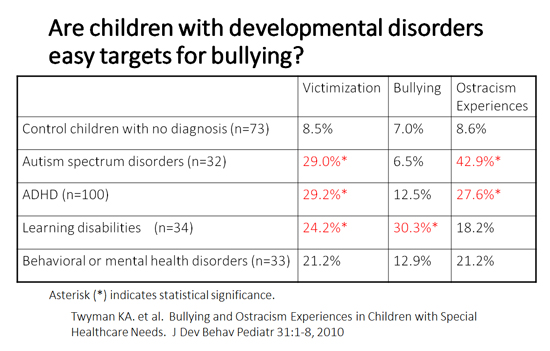Whenever I hear news about a child having committed suicide due to bullying, I am truly filled with sorrow. The mass media usually focus on who instigated the bullying and why those around the child did not notice what was going on. Very little information is given on what kind of child the victim was, and this can also be ascribed to the protection of private information.
Whenever I think about bullying and children who are the targets of bullying, one thing always comes to mind: Developmental disorder.
You may wonder what the connection is between developmental disorder and bullying. I immediately think of children with ADHD. According to the Diagnostic and Statistical Manual of Mental Disorders (DSM-5), hyperactivity and impulsivity are described as behaviors that often interrupt or intrude on others, and oppositional defiant disorder, a common secondary disorder, is also defined as being often deliberately annoying to others and being spiteful or vindictive. Reading this alone seems to suggest that children with ADHD would include quite a few bullies. This also brings to mind children with autism spectrum disorder. Finding it difficult to comprehend irony or flattery and feeling awkward in human relationships, they are easy targets for bullying.
Dr. Kimberly Twyman, a researcher in the United States, has conducted very interesting research on children with developmental disorders, bullying, and ostracism. Her research has established that there is an extremely close relation between developmental disorders and bullying. According to the table below, control children with no diagnosis in the United States make up 7 to 9% of each of the following groups: those who have bullied others, been the target of bullying, or have experienced ostracism.

So, was my initial supposition correct? Actually, the results shown in the table are completely contrary to what I had expected. When children with ADHD and those in the control group are compared, there is no significant difference in the percentage of bullies, and the percentage of children with ADHD who have been bullied is more than three times that of the controls. The figures also show that about 28%, or one in four, report having experienced ostracism. My second supposition was on the mark. Compared with the controls, nearly three times more autistic children have been bullied, as is the case with those with ADHD.
In the case of children with developmental disorders, character formation takes place during a period when they also experience being bullied and ostracism by peers. This also contributes to the onset of the secondary disorders.
If we consider this information from a wider perspective, is it not possible to imagine those children who have been driven to suicide by being bullied also included children with developmental disorders?
If that is the case, adults need to pay close attention to whether children with developmental disorders in their immediate environment are the targets of bullying and feel cornered. By doing so, they will be able to protect children from the worst possible outcome.



 Yoichi Sakakihara
Yoichi Sakakihara










